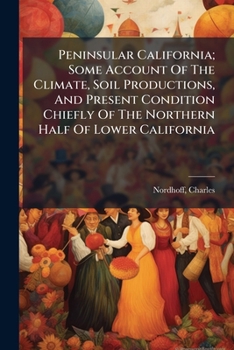Peninsular California; Some Account Of The Climate, Soil Productions, And Present Condition Chiefly Of The Northern Half Of Lower California
"Peninsular California" by Charles Nordhoff offers a detailed account of the northern half of Lower California (now Baja California) in the late 19th century. Nordhoff, a keen observer and experienced travel writer, provides insights into the region's climate, soil, agricultural potential, and the socio-economic conditions of its inhabitants. This historical work explores the unique characteristics of the landscape, from its arid deserts to its fertile valleys, offering a glimpse into the opportunities and challenges faced by those who sought to cultivate the land.
Originally published in 1888, Nordhoff's narrative captures a pivotal moment in the history of Peninsular California, documenting the early stages of its development and the interactions between its indigenous populations and the newcomers who sought to establish a foothold in this remote and promising land. The book remains a valuable resource for historians, geographers, and anyone interested in the rich cultural and environmental heritage of Baja California.
This work has been selected by scholars as being culturally important, and is part of the knowledge base of civilization as we know it. This work was reproduced from the original artifact, and remains as true to the original work as possible. Therefore, you will see the original copyright references, library stamps (as most of these works have been housed in our most important libraries around the world), and other notations in the work.
This work is in the public domain in the United States of America, and possibly other nations. Within the United States, you may freely copy and distribute this work, as no entity (individual or corporate) has a copyright on the body of the work.
As a reproduction of a historical artifact, this work may contain missing or blurred pages, poor pictures, errant marks, etc. Scholars believe, and we concur, that this work is important enough to be preserved, reproduced, and made generally available to the public. We appreciate your support of the preservation process, and thank you for being an important part of keeping this knowledge alive and relevant.





